Text
PHP vs. Python: Making the Right Choice for Web Projects
When it comes to web development, choosing the right programming language is a critical decision that can significantly impact the success of your projects. PHP and Python are two of the most popular languages in this domain, each with its own set of advantages and challenges. This blog will explore the key aspects of both PHP and Python, helping you decide which language is best suited for your web development needs.

Syntax and Readability
Python: Clean and Readable Python is well-known for its clean, readable syntax, which prioritizes simplicity and consistency. The use of indentation to denote code blocks ensures that the code remains organized and easy to understand. This feature is particularly beneficial for beginners, as it allows them to write neat, error-free code with minimal effort. Python's straightforward syntax reduces the learning curve, enabling developers to focus on problem-solving rather than dealing with complex syntax issues.
PHP: Flexible but Verbose PHP, on the other hand, is recognized for its flexibility and power in web development. However, its syntax can be more verbose and less consistent compared to Python. This verbosity can sometimes make the code harder to read and maintain, especially for newcomers. Despite these challenges, PHP’s flexibility allows experienced developers to accomplish a wide range of tasks efficiently once they become familiar with its intricacies.
Learning Curve
Python: Beginner-Friendly Python's gentle learning curve makes it highly accessible to individuals with little to no programming experience. Its clear syntax and extensive documentation help beginners quickly grasp fundamental programming concepts. Additionally, Python’s strong emphasis on readability and simplicity aids new developers in writing clean, understandable code, accelerating their learning process.

PHP: Requires More Patience While PHP is relatively easy to learn, it may require more effort for beginners due to its various quirks and inconsistencies. Thoroughly understanding PHP often involves dealing with its unique intricacies, which can be daunting for new developers. However, once these initial hurdles are overcome, PHP’s powerful capabilities in web development become more apparent.
Community and Resources
Python: Abundant Resources and Active Community Python boasts a large, active community that provides comprehensive documentation, numerous online courses, and a wealth of learning resources. The abundance of libraries and frameworks, coupled with a supportive community, makes it easier for developers to find solutions and accelerate their learning. Python’s versatility across various domains also means its community extends beyond web development, offering support in areas such as data science, machine learning, and automation.
PHP: Extensive but Focused Community PHP also has a robust community and extensive resources, particularly focused on web development. This focused support benefits developers working primarily on web projects. However, the breadth and diversity of Python’s community offer additional advantages for those looking to explore multiple fields and expand their skill set beyond web development.
Versatility and Application Scope
Python: A Multi-Domain Language Python’s versatility is one of its greatest strengths. It is widely used not only in web development but also in data science, machine learning, automation, and more. This broad spectrum of applications provides ample opportunities for developers to apply their Python skills in various areas, making Python a valuable language for those looking to diversify their expertise.
PHP: Specialized for Web Development While PHP excels in web development, it does not offer the same level of versatility as Python. PHP’s primary focus is on server-side scripting, limiting its application scope compared to Python. However, within the realm of web development, PHP is incredibly powerful and efficient, especially for creating dynamic websites and managing server-side operations.
Prototyping and Development Speed
Python: Rapid Prototyping and Experimentation Python, being an interpreted language, allows developers to execute code directly without the need for compilation. This immediate feedback loop facilitates rapid prototyping and experimentation, making the development process smoother and more efficient. Python’s ease of use and quick iteration capabilities are particularly advantageous for startups and projects requiring fast development cycles.
PHP: Quick Testing but Less Streamlined PHP, as a server-side scripting language, also enables quick testing and prototyping. However, the development environment setup and workflow may not be as streamlined as Python, especially for non-web-related tasks. Despite this, PHP remains a robust choice for web development projects where rapid testing and deployment are critical.
Performance and Scalability
Python: Versatility with Performance Considerations Python's interpreted nature can sometimes lead to slower execution compared to compiled languages. However, its extensive library support and the efficiency of frameworks like Django and Flask help mitigate performance concerns. For CPU-intensive tasks, Python's versatility allows integration with languages like C/C++ to boost performance.
PHP: Optimized for Web Performance PHP was specifically designed for web development, which contributes to its excellent performance in handling web requests. Its execution model is well-suited for creating dynamic web pages quickly. PHP 7 and later versions have significantly improved performance and reduced memory usage, making PHP a reliable choice for scalable web applications.
Conclusion: Making the Right Choice
Choosing between PHP and Python ultimately depends on your project requirements, team capabilities, and long-term goals. PHP offers a powerful and flexible platform for web development, excelling in creating dynamic websites and managing server-side operations. On the other hand, Python’s simplicity, readability, and versatility make it a preferred choice for both beginners and experienced developers, particularly for projects that may extend beyond traditional web development.
For those aiming to master advanced Python and harness its full potential, enrolling in a comprehensive Python course can provide the in-depth knowledge and hands-on experience necessary to excel in the field. Whether you choose PHP or Python, understanding each language's strengths and ease-of-use factors will help you make informed decisions that align with your project goals and team capabilities.
In the ever-evolving world of web development, staying informed and adaptable is key to success. By carefully considering the insights provided here, you can choose the right language to power your next web development project.
0 notes
Text
Understanding Your Options: PHP vs. Python in Web Development
In the expansive realm of web development, the choice of programming language plays a pivotal role in determining the success and efficiency of your projects. Among the array of options available, PHP and Python emerge as prominent contenders, each bringing its own strengths and tailored applications. Whether you're a seasoned developer or new to the field, understanding the distinctions between PHP and Python is essential for making well-informed decisions that align with your project objectives and team dynamics.

The Debate: PHP vs. Python
The debate over PHP versus Python has captivated developers for years, driven not just by personal preferences but by practical considerations such as:
Project Requirements
The specific needs and scope of your project heavily influence whether PHP or Python is the optimal choice. PHP excels in web development, adept at creating dynamic websites and applications that integrate seamlessly with databases. Python, renowned for its versatility, extends beyond web development to encompass fields like scientific computing, data analysis, and artificial intelligence, offering a broader spectrum of applications.
Ease of Use
Both PHP and Python are celebrated for their user-friendly nature, albeit catering to different strengths. PHP's syntax is finely tuned for web development tasks, making it intuitive for developers familiar with web technologies. In contrast, Python's clear and readable syntax enhances code maintenance and fosters collaboration, making it especially appealing to beginners and teams prioritizing code clarity.
Community and Support
The robustness of a programming language's community profoundly influences its evolution and support ecosystem. PHP boasts a dedicated community focused on web development, ensuring comprehensive resources, tutorials, and documentation tailored to specific needs. Python, with its expansive and diverse community, serves a broad spectrum of professionals across various domains, driving continual growth and adaptation within the tech industry.
Performance and Scalability
Performance considerations are crucial, particularly for handling high-traffic web applications. PHP has significantly enhanced its performance with advancements like PHP 7, complemented by frameworks like Laravel and Symfony designed for scalability and efficiency. Python, although not traditionally noted for raw speed, compensates with frameworks such as Django and Flask, optimizing performance through efficient coding practices and robust third-party libraries.
PHP: Powering Web Development
PHP, originally an acronym for Hypertext Preprocessor, has been a stalwart in web development since its inception. Key reasons PHP remains a preferred choice include:
Specialization: Tailored specifically for web development, PHP excels in generating dynamic content and integrating seamlessly with databases. Frameworks like Laravel and Symfony provide developers with powerful tools and libraries for rapid application development.
Community and Resources: PHP benefits from a large, engaged community that contributes extensively to documentation and support resources. This wealth of knowledge ensures swift resolution of challenges, reinforcing PHP's reliability for building and maintaining web applications.
Scalability and Performance: PHP's evolution, particularly with PHP 7, has bolstered its scalability and performance capabilities. Its compatibility with leading web servers such as Apache and Nginx further enhances deployment flexibility and operational efficiency.

Python: Versatility and Beyond
Python's ascent in popularity is fueled by its adaptability and widespread applicability across diverse domains. Key reasons developers favor Python extend beyond traditional web development:
Readability and Simplicity: Python's clean syntax enhances readability and simplifies code maintenance, fostering collaboration and minimizing errors. This characteristic makes Python an excellent choice for projects prioritizing clarity and ease of comprehension.
Rich Ecosystem: Python boasts a vast ecosystem of libraries and frameworks catering to varied needs—from Django and Flask for web development to specialized tools like NumPy and Pandas for scientific computing and data analysis. The language's support extends to advanced fields such as machine learning with libraries like TensorFlow and PyTorch.
Community and Innovation: Python's expansive community drives continuous innovation and adaptation, ensuring the language remains at the forefront of technological advancements. This collaborative spirit underscores Python's relevance across industries and its resilience in evolving tech landscapes.
Choosing the Right Path
When deciding between PHP and Python for your web development projects, consider these critical factors:
Project Requirements: Assess whether your project necessitates specialized web development capabilities (PHP) or requires the flexibility to expand into diverse domains (Python).
Team Expertise: Evaluate your team's familiarity with each language and their proficiency in leveraging associated frameworks and libraries effectively.
Future Growth: Stay attuned to emerging trends and evolving web technologies to anticipate future project needs. Ensure your chosen language aligns with long-term goals and supports scalability as your project evolves.
Conclusion
In conclusion, PHP excels in specialized web development tasks with its robust frameworks and dedicated community. Meanwhile, Python offers versatility and scalability across a broad spectrum of applications, making it an ideal choice for projects requiring flexibility and future-proofing. By carefully weighing these considerations against your project's requirements and team capabilities, you can confidently navigate the dynamic landscape of web development, whether harnessing PHP's established strengths or exploring Python's expansive possibilities.
For those eager to deepen their Python expertise, consider exploring advanced courses or specialized training opportunities such as a Python course in Hyderabad, offering invaluable insights and practical skills to master this versatile language.
0 notes
Text
Unleashing Python's Potential: A Comprehensive Exploration
Python, renowned as one of the most adaptable programming languages, presents a multitude of learning avenues, spanning from fundamental principles to avant-garde applications across various domains. Immerse yourself in the realm of Python and embark on an odyssey of enlightenment with our extensive Python Course in Hyderabad, meticulously crafted to unleash your full capabilities and kindle your career aspirations.

Navigating Python: A Pathway to Proficiency
Embark on a journey into Python's depths and unearth a trove of knowledge awaiting discovery. Here’s an intricate guide detailing the spectrum of insights Python offers:
Grasping Basic Programming Concepts
Syntax and Semantics: Acquaint yourself with Python's fundamental framework and syntax regulations governing code structure, encompassing essential elements like indentation, statement formation, and expression evaluation.
Data Types and Variables: Master the manipulation of diverse data types - integers, floats, strings, lists, tuples, dictionaries, and sets - refining your expertise in data management and manipulation.
Control Structures: Harness the potency of loops (for, while) and conditional statements (if, else, elif) to govern program flow, facilitating efficient execution and logical decision-making.
Functions: Immerse yourself in the intricacies of function definition and invocation, grasp the subtleties of parameters and return values, and explore concepts such as scope and recursion for heightened code organization and efficiency.
Error Handling: Equip yourself with adept tools to proficiently manage errors and exceptions, ensuring the resilience and robustness of your Python programs amidst unforeseen challenges.
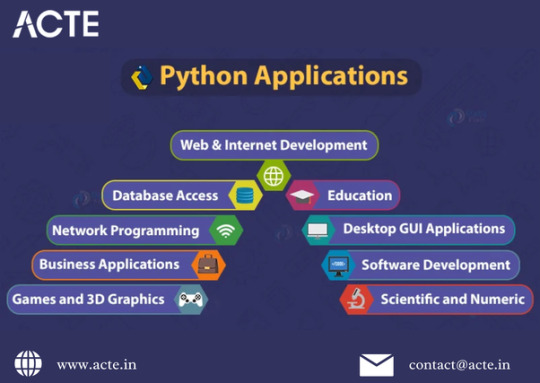
Exploring Advanced Programming Concepts
Object-Oriented Programming (OOP): Unlock the prowess of OOP principles as you delve into class and object creation and manipulation, unraveling concepts like inheritance, polymorphism, encapsulation, and abstraction. Enroll in our Python Online Course to delve deeper into Object-Oriented Programming (OOP) concepts and broaden your horizons.
Modules and Packages: Harness Python's expansive library ecosystem by mastering the importation and utilization of standard libraries and third-party packages, seamlessly augmenting your application’s functionality.
File Handling: Navigate the complexities of file I/O operations, learning to read from and write to files while adeptly managing various file formats like text, CSV, and JSON for efficient data handling.
Decorators and Generators: Elevate your coding prowess with advanced features such as decorators and generators, empowering you to optimize and streamline your code for enhanced performance and functionality.
Concurrency: Embrace the realm of concurrent programming as you delve into threading and asynchronous programming techniques, mastering the art of handling parallel operations with finesse.
Unlocking Your Potential with Python
Python transcends boundaries, catering to an array of interests and career trajectories. Whether you’re a fledgling enthusiast embarking on your coding odyssey or a seasoned professional seeking to expand your skill set, Python serves as a gateway to success across diverse domains such as data science, web development, automation, software engineering, game development, networking, cybersecurity, and IoT.
Its innate simplicity and readability render it accessible to novices, while its robustness and versatility make it indispensable for seasoned professionals. Embrace the power of Python, unlock your potential, and embark on a journey towards unparalleled success in the dynamic realm of technology and innovation.
0 notes
Text
Unlocking Career Potential with Python: Why Mastering Python is Essential
In today's fast-paced digital world, many aspiring programmers and career changers ask, "Is Python worth learning?" As a Python Developer at Tata Consultancy Services, I've witnessed firsthand how mastering Python can significantly boost programming skills and career opportunities. This comprehensive Python Course in Hyderabad will prepare you to generate responses, provide explanations, and offer guidance on Python and many other subjects based on extensive training data. So, is learning Python a worthwhile investment of your time and effort? Let's delve into why mastering Python is not just important but highly advantageous, particularly for securing job opportunities.
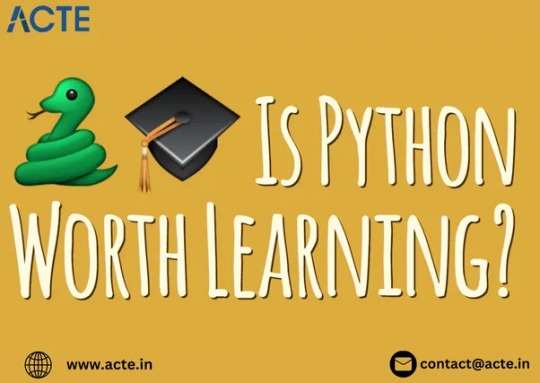
Why Python is Worth Learning:
Simplicity and Readability: Python’s clean and straightforward syntax makes it an ideal choice for beginners and experienced programmers alike. Its simplicity allows developers to focus on problem-solving instead of getting bogged down by complex syntax.
Versatility: Python is a versatile, general-purpose language used across various domains, including web development, data science, machine learning, artificial intelligence, and automation. This broad applicability makes Python a valuable skill in many industries.
Rich Ecosystem and Libraries: Python boasts a vast ecosystem of libraries and frameworks that support rapid development. Libraries such as Pandas and NumPy for data manipulation, Django and Flask for web development, TensorFlow and PyTorch for machine learning, and Selenium for web automation highlight its extensive resources.
Community Support: Python has a large, active, and supportive community, ensuring ample documentation, online courses, forums, and resources are available to help you learn and troubleshoot.
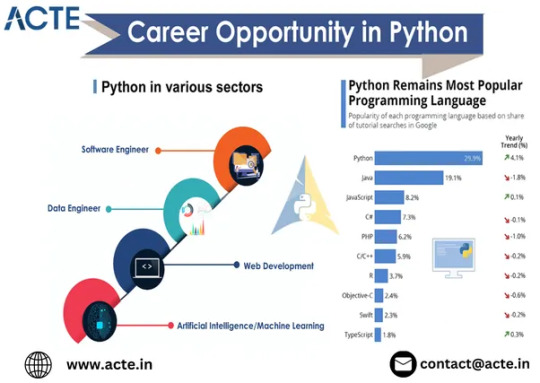
Python and Job Opportunities:
High Demand: Python is one of the most sought-after programming languages in the job market. Industries such as tech, finance, healthcare, and academia seek Python developers for its applicability in various fields.
Diverse Job Roles: Proficiency in Python opens up numerous job roles, including Software Developer, Data Scientist, Machine Learning Engineer, Web Developer, Automation Engineer, and DevOps Engineer.
Competitive Salaries: Jobs requiring Python skills often offer competitive salaries. Python developers are highly valued, and their compensation reflects the demand and utility of their skills.
Growth Opportunities: Learning Python can serve as a gateway to advanced technologies and specializations. Fields such as artificial intelligence, data science, and machine learning are flourishing, with Python as the primary language.
Ease of Transition: For those already familiar with other programming languages, transitioning to Python is relatively easy. Its readability and efficiency make it a suitable second or third language for experienced programmers.
Conclusion
Mastering Python is highly beneficial due to its versatility and the wide range of job opportunities it unlocks. Whether you are starting your career or transitioning to a more promising field, Python provides a solid foundation and is a valuable asset in today’s job market. Its ease of learning, combined with extensive applicability and high industry demand, makes Python an excellent choice for enhancing your career prospects. Don’t hesitate—unlock the power of Python and embark on your journey to professional success today!
0 notes
Text
Unlocking the Power of Python: Why Learning Python is Essential
As a Python Developer at Tata Consultancy Services, I've witnessed firsthand the incredible impact that Python can have on one's programming journey and career prospects. If you're considering expanding your skill set and advancing your career, enrolling in a Python Course in Hyderabad could be a game-changer. Here's a detailed exploration of why learning Python is not just important but also immensely beneficial:

1. Ease of Learning: Python's simplicity and readability make it an ideal language for beginners. Its straightforward syntax and structure enable new programmers to grasp fundamental concepts quickly, paving the way for a smooth learning experience without being overwhelmed by complex rules.
2. Versatility: Python is a Swiss Army knife of programming languages, finding applications across various domains. Whether it's web development, data science, machine learning, automation, or game development, Python's versatility allows you to tackle diverse projects and explore different fields with ease.
3. High Demand: In today's tech-driven world, Python is in high demand, particularly in emerging fields like data science, artificial intelligence, and machine learning. The widespread adoption of Python has created a vast pool of job opportunities with competitive salaries for skilled Python developers.
4. Community Support: Python boasts a vibrant and supportive community of developers worldwide. This community support is invaluable for learning, troubleshooting, and collaborating on projects. Countless tutorials, forums, and documentation resources are available online, facilitating continuous learning and growth.
5. Integration: Python seamlessly integrates with other languages and technologies, making it a versatile tool in various programming environments. Its ability to interact with databases, perform network operations, and interface with system calls and libraries enhances its utility across different domains.

6. Automation: Python excels in scripting and automating repetitive tasks, saving time and improving efficiency. From file management to web scraping, Python's simplicity and powerful libraries enable developers to automate a wide range of tasks, streamlining workflows and increasing productivity.
7. Career Growth: Learning Python opens doors to a plethora of career opportunities in the tech industry. Whether you aspire to become a software developer, data analyst, system administrator, or AI engineer, Python serves as a stepping stone to advanced fields, offering significant potential for career growth and advancement.
In conclusion, learning Python is not just about acquiring programming skills; it's about embracing a versatile and powerful tool that can transform your career trajectory. With its ease of learning, versatility, high demand, strong community support, excellent integration capabilities, powerful automation features, and significant potential for career growth, Python stands as a cornerstone of modern programming education and professional development. So, take the plunge and embark on your Python learning journey today!
0 notes
Text
Unlocking the Secrets of Advanced Python Programming
As a Python Developer at Tata Consultancy Services, I understand the importance of advancing your Python skills to tackle more complex challenges. Mastering advanced Python requires a strategic approach that combines core principles, exploration of advanced topics, practical projects, and community engagement. If you're ready to take your Python expertise to the next level, enrolling in a Python Course in Hyderabad can provide the guidance and resources you need to succeed. Here's a detailed roadmap to help you embark on this enriching journey.
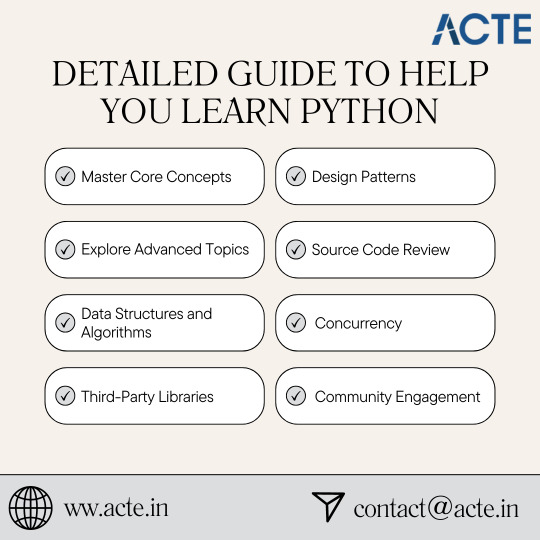
1. Master Core Concepts: Build a solid foundation by reinforcing your understanding of Python basics, including variables, data types, control structures, functions, and object-oriented programming (OOP). A strong grasp of these fundamentals is essential for tackling advanced topics effectively.
2. Explore Advanced Topics: Dive deeper into complex Python features such as decorators, generators, context managers, and metaclasses. These advanced concepts offer powerful ways to enhance the functionality and flexibility of your Python code.
3. Data Structures and Algorithms: Delve into the realm of data structures (heaps, graphs, trees) and algorithms (sorting, searching, dynamic programming) to write efficient and optimized code. Understanding these principles is crucial for solving complex problems with elegance and precision.
4. Third-Party Libraries: Familiarize yourself with popular Python libraries like NumPy, pandas, Matplotlib, Seaborn, Django, and Flask. These libraries empower you to perform advanced tasks in areas such as data analysis, visualization, web development, and more.
5. Concurrency: Learn about concurrency mechanisms such as threading, multiprocessing, and asynchronous programming (asyncio) to handle multiple tasks simultaneously and optimize performance in Python applications.
6. Design Patterns: Study common design patterns like Singleton, Factory, Observer, and Strategy to architect scalable and maintainable Python code. These patterns provide proven solutions to recurring design challenges in software development.
7. Project Work: Apply your knowledge by undertaking challenging projects that push the boundaries of your skills. Whether it's building web applications, data analysis pipelines, machine learning models, or automation scripts, hands-on projects provide invaluable real-world experience.
8. Source Code Review: Analyze Python code from open-source projects on platforms like GitHub to gain insights into different coding styles and best practices. Contributing to open-source projects also allows you to collaborate with other developers and contribute to the Python community.
9. Advanced Tutorials and Courses: Enroll in specialized Python online course and tutorials that focus on advanced topics. Platforms like ACTE Technologies offer comprehensive courses designed to deepen your expertise and broaden your skill set.

10. Community Engagement: Join Python communities, participate in webinars, and engage with forums like Stack Overflow and Reddit's r/learnpython. Interacting with fellow developers allows you to seek guidance, share knowledge, and stay updated on the latest trends and developments in the Python ecosystem.
By following this roadmap, you can progressively enhance your proficiency in advanced Python programming, equipping yourself with the skills and knowledge needed to tackle complex challenges with confidence and creativity.
0 notes
Text
Delving into Python’s Expansive Ecosystem: Transformative Applications and Impact
Python stands as more than merely a programming language; it's a transformative force across various sectors. Its blend of simplicity and powerful functionalities has propelled it into a multitude of sectors, revolutionizing traditional methodologies with innovative solutions. From web development and data science to artificial intelligence (AI), financial analytics, scientific computation, and beyond, Python’s scope is vast. Embarking on a Python Course in Hyderabad can significantly sharpen your expertise, unlocking the door to ample opportunities Python presents in numerous fields. This blog delves into Python's versatile applications and its significant influence on the industries it pervades.
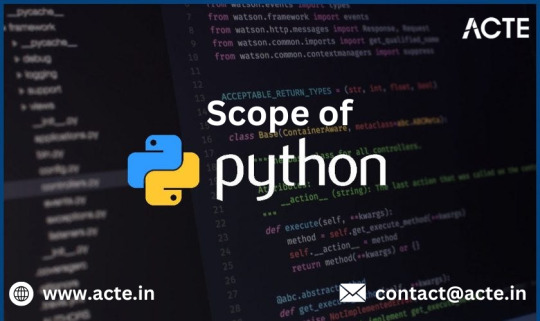
Diverse Applications Across Multiple Fields
Web Development
Python streamlines the web development process via its frameworks such as Django and Flask, facilitating the creation of secure, scalable websites. It’s the powerhouse behind Instagram’s backend and empowers startups to swiftly roll out their platforms, proving indispensable for web developers.
Data Science and Analytics
Acting as the data science community's common tongue, Python, with its libraries like pandas, NumPy, and Matplotlib, simplifies complex data analyses, enabling efficient insight extraction and trend forecasting. This turns data into a pivotal asset in strategic business decisions.
Artificial Intelligence and Machine Learning
The simplicity and extensive library support in Python render it perfect for AI and ML endeavors. Tools like TensorFlow, Keras, and Scikit-learn have made sophisticated machine learning technologies accessible to all, facilitating the creation of systems and models capable of tasks once thought exclusive to human intelligence.
Finance
Python finds extensive use in finance for both analytical and algorithmic operations, including financial modeling and trading strategy development. Libraries such as QuantLib and pyfolio support asset analysis, risk management, and portfolio optimization, positioning Python as a core tool in finance and trading.
Scientific Computing
Invaluable in scientific research, Python aids complex calculations, simulations, and data analysis across various scientific disciplines. It accelerates prototyping and problem-scaling in research areas, assisted by tools like SciPy, NumPy, and BioPython.
Education
With its clear syntax, Python emerges as a prime tool in education, often being the first programming language taught. It bridges the gap between theoretical computational concepts and their practical application, promoting problem-solving and computational thinking skills.
Game Development
Python extends its reach to game development, where libraries like Pygame enable swift game creation with minimal code, appealing particularly to indie developers.
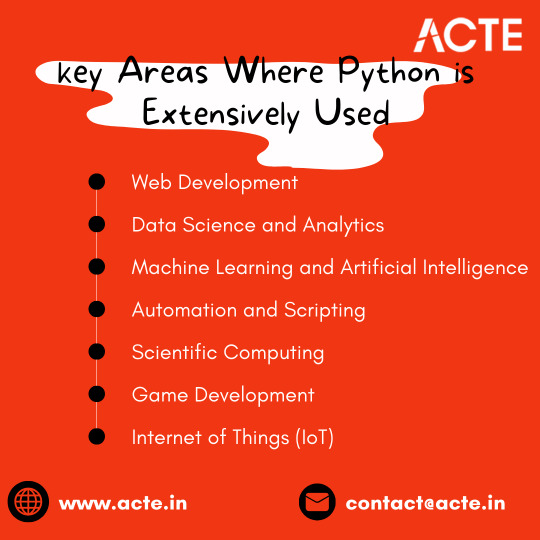
Influential Impact of Python
Python's extensive applications are matched by its profound impact and the vibrant community it has nurtured. Hosting millions of developers with a growing pool of resources, libraries, and frameworks, Python makes a significant mark in the tech sphere.
Community and Collaboration: Python's robust community is among its greatest assets, celebrated for its inclusivity and diversity. A wealth of resources, coupled with international meetups and conferences, cultivates a collaborative atmosphere that drives Python’s widespread use and innovation across fields. This Python Online course is designed to help both novices and seasoned developers contribute to groundbreaking projects and advance professionally.
Innovation and Accessibility: By lowering the barrier to entry in programming, Python fosters greater diversity in software development. Its approachability and versatility invite wider participation in development activities, spurring innovation and accelerating technological progress.
Role in Education: Introducing more students to programming through Python prepares the future workforce for a landscape where coding might be as crucial as conventional literacy skills.
Conclusion
The simplicity and potency of Python account for its widespread acceptance and significant role in reshaping the technological domain. As industries and technology evolve, Python’s influence is poised to grow, heralding a future rich in innovation and cross-industry transformation. Python is not just for seasoned developers; it offers a world brimming with possibilities for those eager to explore and make their mark.
0 notes
Text
Unlocking Python's Unique Features: A Comprehensive Overview
Python, celebrated for its simplicity, versatility, and efficiency, offers a distinctive array of features that set it apart from other programming languages. As a Python Developer at Tata Consultancy Services, I've witnessed firsthand the power and appeal of Python in modern software development. Let's delve into some of Python's standout features that make it a favorite among developers worldwide.

Simplicity and Readability: Python prioritizes simplicity and readability with its clear and concise syntax. This approach makes Python remarkably easy to learn and understand, even for beginners. Enrolling in a Python Course in Hyderabad can introduce you to Python's user-friendly syntax, paving the way for rapid skill development.
Dynamic Typing: Python's dynamic typing means variables are not explicitly declared with a data type. This flexibility simplifies coding and enhances productivity, allowing developers to focus more on problem-solving than on syntax intricacies.
Interpreted Nature: Python is an interpreted language, enabling immediate code execution and streamlined debugging without the need for compilation. This aspect accelerates the development process, fostering a more agile and iterative approach to coding.
Extensive Standard Library: Python boasts an extensive standard library, providing modules and packages for diverse tasks such as file I/O, networking, and database access. This rich ecosystem minimizes reliance on external dependencies, enhancing efficiency and code maintainability.
High-Level Data Structures: Python supports high-level data structures like lists, dictionaries, and sets, facilitating efficient handling of complex data manipulation tasks. These built-in data structures empower developers to tackle diverse challenges with ease.
Dynamically Extensible: Python enables dynamic modification of objects and classes during runtime, supporting powerful programming paradigms like metaprogramming. This flexibility empowers developers to adapt and evolve their codebases to meet evolving requirements.
Strong Community Support: Python boasts a vibrant and supportive community of developers, offering extensive documentation, tutorials, and a plethora of third-party libraries and frameworks. Engaging with this community through a Python online course can enrich your learning journey and expand your network of fellow developers and enthusiasts.

Cross-Platform Compatibility: Python's platform independence allows code written in Python to run seamlessly across various operating systems without modification. This cross-platform compatibility enhances versatility and accessibility, making Python an ideal choice for a wide range of projects.
Object-Oriented Programming (OOP): Python supports object-oriented programming principles, enabling the creation of modular and reusable code through classes and inheritance. This OOP support fosters code organization and scalability, facilitating the development of complex applications.
Functional Programming Features: In addition to OOP, Python also embraces functional programming paradigms, treating functions as first-class citizens and supporting techniques like lambda functions and list comprehensions. This versatility empowers developers to leverage multiple programming styles to address diverse requirements.
In conclusion, Python's unique features collectively contribute to its popularity and widespread adoption across various domains, including web development, data science, machine learning, automation, and beyond. Enrolling in a Python course in Hyderabad can equip you with the skills and knowledge needed to leverage Python's capabilities effectively in your projects, opening doors to endless possibilities in the world of software development.
0 notes
Text
Delving into Python's Extensive Applications and Impact
Python transcends being merely a programming language; it's a transformative force bringing innovative solutions to multiple sectors. Celebrated for its straightforwardness and robust features, Python has penetrated various industries, altering conventional problem-solving and implementation methods. With applications sprawled across web development, data science, AI, finance, and scientific computing among others, gaining Python skills through a course in Hyderabad can open doors to numerous professional possibilities. This article delves deep into Python's wide-ranging applications and its significant implications on the industries it impacts.

Flexibility Across Different Domains
1. Web Development
Python streamlines web development with frameworks like Django and Flask, which make the construction of secure, scalable, and maintainable websites faster. From powering Instagram’s backend to enabling startups to launch products swiftly, Python’s tools are indispensable for web developers.
2. Data Science and Analytics
Recognized as the foundational language of data science, Python with libraries like pandas, NumPy, and Matplotlib simplifies complex data analysis, enabling data scientists to extract insights and anticipate trends efficiently. Python’s capabilities make data more actionable, influencing strategic business decisions.
3. Artificial Intelligence and Machine Learning
The simplicity and comprehensive library ecosystem of Python make it perfectly suited for AI and ML projects. Tools such as TensorFlow, Keras, and Scikit-learn provide widespread access to machine learning technologies, allowing users from beginners to professionals to develop predictive models and intelligent systems that were traditionally the domain of human intelligence.
4. Finance
Python is employed in finance for quantitative and qualitative analyses, algorithmic trading, and financial modeling. Its libraries like QuantLib and pyfolio are crucial for asset pricing, risk management, and portfolio optimization, cementing Python’s role in financial engineering and strategy formulation.
5. Scientific Computing
Indispensable in scientific computing, Python supports intricate calculations, simulations, data visualization, and statistical analysis in physics, chemistry, and bioinformatics. Tools such as SciPy, NumPy, and BioPython allow researchers to prototype and scale problems with high efficiency.
6. Education
Python’s lucid syntax and readability make it an excellent educational tool for programming. Often the introductory language in universities, Python serves as the pivotal tool for computational thinking and effective problem-solving, bridging the gap between theoretical computational concepts and their practical applications.
7. Game Development
Python also ventures into game development. With libraries like Pygame, developers can create games more quickly and with fewer lines of code compared to more intricate languages like C++. This adaptability makes Python especially favorable among indie game developers.
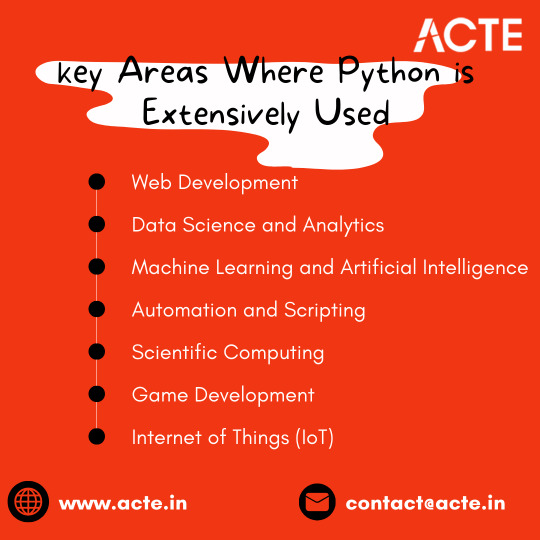
Influence of Python
Python’s influence is observable in its diverse applications as well as the robust community it has cultivated. With millions of developers and a dynamic ecosystem of libraries, Python leaves a significant mark in the tech world.
Community and Collaboration: The Python community, known for its inclusivity and diversity, coupled with a wealth of resources and global meetups, fosters a collaborative environment that accelerates Python’s growth and adoption across fields. Whether you are a beginner or an experienced developer, this Python Online course will help you contribute to innovative projects and advance your career.
Innovation and Development: Python dramatically reduces the barriers to entry into programming and technological development. Its easy-to-learn nature and versatility encourage a wider demographic to develop software, leading to greater innovation and faster technological evolution.
Educational Tool: Python’s integration into educational syllabi exposes more students to programming early on, equipping the next generation for a future where coding literacy might be as essential as traditional literacy.
Conclusion
Python's ease combined with its powerful functionalities explain its widespread adoption and profound impact across the technology landscape. As businesses and technologies evolve, Python’s role is expected to grow, driving innovation and transformation in more fields. Python offers a realm of opportunities whether you are an experienced programmer or an enthusiastic beginner eager to explore.
0 notes
Text
Launch Your Python Career with Beginner-Friendly Job Opportunities
Within the ever-evolving tech landscape, Python has solidified its status as a programming powerhouse due to its flexibility, simplicity, and broad spectrum of use cases. Whether you're a newcomer to coding or aiming to shift your career trajectory, Python provides a rich soil for growing your programming abilities and propelling you into a fruitful career. Undertaking a Python course in Hyderabad could markedly improve your coding prowess and elevate your likelihood of clinching a coveted position in the technology sector. This article dives into the reasons Python stands as a prime selection for novices and outlines enticing entry-level positions that could act as catalysts in your tech career journey.

Why Opt for Python?
Before diving into potential career paths, let's explore the factors that render Python a top pick for tech novices:
Ease of Learning: Python's straightforward and user-friendly syntax makes it an accessible entry point for those new to programming.
Wide-ranging Use: Spanning web development, data analytics, machine learning, and cybersecurity, the applications for Python are extensive and diverse.
Community Support: The robust and supportive Python community offers extensive resources, advice, and assistance throughout your learning process.
Career Opportunities: Given its prevalence in state-of-the-art technology, there's a continuous and growing need for professionals proficient in Python.
Entry-Level Python Career Paths
Entering the Python realm doesn't necessitate expert-level knowledge right away. Below are entry-level roles for which a foundational understanding of Python can be your gateway:
Python Developer: The quintessential role for beginners. Entry-level Python developers partake in crafting server-side logic, ensuring applications run smoothly, and merging frontend components developed by teammates.
Data Analyst: Ideal for those drawn to statistical patterns and analysis, launching as a data analyst with Python’s robust libraries such as Pandas and NumPy makes for a perfect match.
Quality Assurance (QA) Engineer: QA engineers are pivotal in the software development cycle, ensuring applications adhere to quality benchmarks. Python skills are invaluable for automating test scripts to assess application functionality and efficacy.
Entry-Level Machine Learning Engineer: Enticed by AI and machine learning? Starting as a machine learning engineer offers an engaging foray into the field, buoyed by Python’s simplicity and powerful libraries like TensorFlow and scikit-learn.
Junior DevOps Engineer: Python’s prowess in automating and optimizing complex systems is indispensable for DevOps positions. Even as a novice, your Python abilities facilitate automating deployment and managing configuration tools.

Cultivating Your Python Career
Your journey into a Python career extends beyond acquiring basic syntax knowledge. Here's how to solidify your foundation and navigate towards your initial role:
Continuous Learning: Maintain an inquisitive mindset and pursue ongoing education. Python is ever-evolving, and updating your knowledge is key.
Project Building: Practical experience is priceless. Undertake personal or open-source projects to apply your skills in real-world scenarios and bolster your portfolio.
Networking: Connect with the Python community via forums, gatherings, and events. Networking could open doors to mentorship and employment opportunities.
Interview Preparation: Acquaint yourself with typical Python interview inquiries and coding tests. Hands-on practice will enhance your assurance and interview performance.
Staying Informed: Stay on top of Python and tech industry trends to make well-informed choices about your career path.
Conclusion
Forging a career in tech with Python as your foundation presents vast possibilities. Python’s adaptability makes it appropriate for a variety of roles across different sectors. Fueled by dedication, continuous learning, and hands-on experience, embarking on entry-level positions can kickstart a prosperous Python career. Recall, every expert began as a novice. The journey into Python starts with your initial line of code.
0 notes
Text
Navigating Python Frameworks: A Comprehensive Guide to Finding the Perfect Fit
In recent years, the Python programming language has witnessed an exponential rise in popularity, owing to its versatility and wide-ranging applications. A significant contributing factor to its widespread adoption is the abundance of frameworks available, simplifying tasks across various domains such as web development, data analysis, and machine learning. However, with a plethora of options to choose from, aspiring developers often find themselves overwhelmed when selecting the most suitable Python framework for their needs. To explore a diverse array of Python frameworks, consider enrolling in a Python Course in Hyderabad, where you can delve into essential tools like Pandas, NumPy, Matplotlib, and Scikit-learn, equipping yourself with indispensable skills for data analysis, machine learning, and web development. In this detailed guide, we'll embark on an exploration of popular Python frameworks and their respective domains to facilitate informed decision-making.

Understanding the Landscape:
Before delving into the specifics of Python frameworks, it's imperative to grasp the multifaceted landscape of Python development. Python frameworks serve as repositories of pre-written code and libraries, offering developers a structured approach to application development and problem-solving. By providing tools, utilities, and conventions, these frameworks streamline the development process, enabling developers to write cleaner, more maintainable code.
Factors to Consider:
The selection of a Python framework involves considering several factors, including personal interests, career aspirations, and the intended application domain. Careful assessment of individual needs and requirements is paramount to selecting a framework that aligns with one's objectives. Furthermore, factors such as community support, documentation quality, and ease of learning significantly influence the overall developer experience with a framework.
Exploring Popular Python Frameworks:
Let's delve into some of the most widely utilized Python frameworks and their respective domains:
Pandas:
Pandas stands as a robust library for data manipulation, analysis, and cleaning within data science and analytics projects. Offering data structures and functions for efficient handling of large datasets, Pandas facilitates operations like filtering, grouping, and aggregation.
NumPy:
NumPy serves as an indispensable tool for numerical computing, array manipulation, and mathematical operations in Python. With high-performance multidimensional arrays and an extensive collection of mathematical functions, NumPy finds application in scientific computing and machine learning endeavors.
Matplotlib and Seaborn:
Matplotlib and Seaborn emerge as popular choices for data visualization in Python. These libraries empower developers to create a diverse range of plots, charts, and graphs, effectively communicating insights derived from data. While Matplotlib offers extensive customization options, Seaborn provides a higher-level interface for crafting visually appealing statistical visualizations.
Scikit-learn:
Scikit-learn stands out as a versatile library for machine learning tasks in Python. Offering a wide array of algorithms and tools for classification, regression, clustering, and model evaluation, Scikit-learn caters to both novice and experienced machine learning practitioners.
TensorFlow and PyTorch:
TensorFlow and PyTorch represent leading frameworks for deep learning and neural network development. Equipped with high-level APIs and tools, these frameworks facilitate the building, training, and deployment of complex models across diverse applications such as image recognition and natural language processing.
Django and Flask:
Django and Flask emerge as prominent web frameworks for constructing web applications, APIs, and backend services in Python. While Django offers a comprehensive feature set following the "batteries-included" philosophy, Flask distinguishes itself with its lightweight and flexible nature, allowing developers to tailor their components as needed. To deepen your understanding of Python frameworks and their applications in data science, machine learning, and web development, consider enrolling in a Python Course Online.
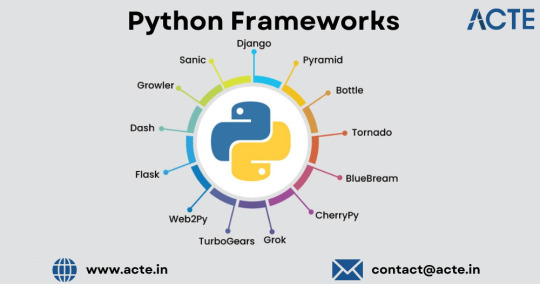
Keras:
Keras serves as a high-level deep learning API atop TensorFlow, facilitating rapid prototyping and experimentation with neural networks. With its user-friendly interface, Keras is ideal for developing and refining deep learning models.
Beautiful Soup and Scrapy:
Beautiful Soup and Scrapy prove invaluable for web scraping and crawling tasks in Python. These libraries enable developers to extract data from websites and web pages, facilitating data collection and aggregation for further analysis.
Choosing the Right Framework:
When selecting a Python framework, it's essential to consider one's specific interests and career trajectory within the realm of Python development. Whether the focus lies in data science, machine learning, web development, or any other domain, there exists a framework tailored to individual needs. Furthermore, exploring tutorials, documentation, and community support for each framework can offer valuable insights into usability and suitability for various projects.
Conclusion:
In summary, the choice of a Python framework hinges on a multitude of factors, including personal interests, career goals, and the intended application domain. By navigating the diverse landscape of Python frameworks and understanding their respective domains, developers can make informed decisions aligned with their objectives. Whether embarking on data analysis, machine learning, web development, or other Python-based endeavors, the availability of frameworks ensures that there's a tool perfectly suited to bring ideas to fruition.
0 notes
Text
Java vs. Python: An In-depth Comparison
The perennial debate between Java and Python as the superior programming language has long intrigued developers. Each language possesses distinct strengths and weaknesses, influencing the choice between them. Delve into the intricacies of Java and Python with us as we explore their syntax, performance, ecosystem, community support, and use cases to help you determine which language best suits your needs.
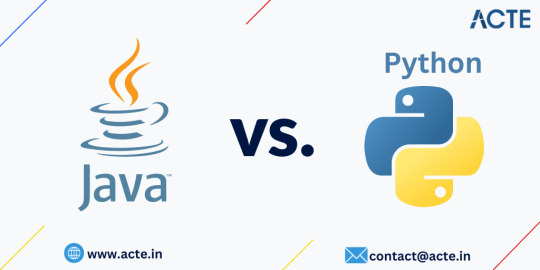
Syntax and Readability:
Python's simplicity and readability, akin to natural language, make it a preferred choice for both beginners and seasoned developers. Java, though more verbose, offers familiarity to those transitioning from a C/C++ background, enhancing code clarity and maintainability, particularly in larger projects.
Performance:
Java often outpaces Python in execution speed, especially for tasks demanding intensive computations or large-scale applications. Features like Just-In-Time (JIT) compilation and static typing contribute to Java's advantage. Despite Python's interpreted nature leading to slower execution speeds, its ease of development may offset this difference in many scenarios.
Ecosystem and Libraries:
Java boasts a diverse ecosystem with libraries, frameworks, and tools tailored for various development needs, from enterprise to web and mobile app development. Similarly, Python's ecosystem is extensive, excelling particularly in fields like data science, machine learning, web development, and scientific computing. Specialized libraries such as NumPy, pandas, TensorFlow, and scikit-learn further augment Python's appeal.
Community and Support:
Both Java and Python benefit from vibrant developer communities, offering support, knowledge-sharing, and resources through forums, documentation, and tutorials. Python's community is noted for its inclusivity and accessibility, making it attractive for newcomers. Enroll in an online Python course to gain comprehensive knowledge and join this thriving community.
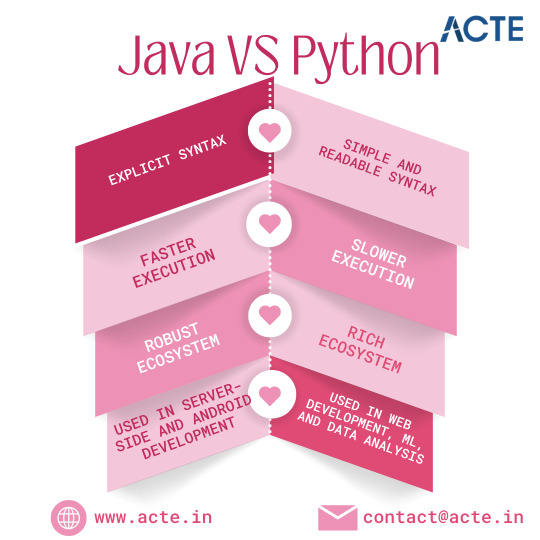
Use Cases and Domains:
Java finds application in enterprise environments, server-side applications, Android app development, and domains prioritizing performance and scalability. Python thrives in web development, data analysis, machine learning, artificial intelligence, scientific computing, automation, and scripting.
Conclusion:
Choosing between Java and Python hinges on various factors such as project requirements, performance needs, ecosystem support, and personal preferences. Both languages offer unique advantages and find utility across a broad spectrum of applications and domains. Whether opting for Python's simplicity or Java's robustness, developers wield powerful tools driving innovation in today's digital landscape.
0 notes
Text
Laying the Foundations for Python Mastery: Essential Skills for New Learners
Setting out to learn Python is a thrilling venture that doesn't strictly demand any prerequisites. Yet, entering this journey with a strong background in key areas can greatly improve your learning experience and lead to success. Here, we'll discuss some essential skills and insights to enhance your Python learning path, empowering you to unlock your potential and begin a fulfilling career with our top-notch Python Course in Hyderabad.

Essential Computer Literacy
Python is known for its beginner-friendly nature, but possessing fundamental computer skills can ease the process. Skills such as managing files, navigating through the operating system, and familiarity with using a text editor or IDE are invaluable for a smooth experience in Python programming.
Problem-Solving Abilities
At its heart, programming revolves around solving problems. Developing your ability to dissect complex problems into simpler, manageable tasks and formulating solutions is vital for programming success. Engage in logical thinking and structured problem-solving to tackle coding challenges confidently.
Understanding Mathematical Principles
Having a grasp on basic mathematical principles can be beneficial, although not essential. This includes understanding arithmetic operations, variables, functions, and elementary algebra which lay the groundwork for Python programming, particularly when working with data, algorithms, and computation tasks. Consider enrolling in our Python Online Course to hone your programming skills surrounded by a dynamic learning community.
Logical Reasoning
Programming fundamentally relies on logical reasoning. Mastery over understanding sequences, conditional statements, loops, and Boolean logic is crucial for crafting effective and efficient code. By honing your logical reasoning, you'll develop a systematic approach to Python problem-solving.

English Proficiency
Given that a vast majority of programming resources, tutorials, and documentation are in English, having a basic grasp of the language can open up access to numerous learning materials. However, non-English speakers have access to resources in various languages to support their learning journey.
Curiosity and Resilience
Curiosity drives the exploration and experiment, leading to learning. Enter the realm of Python with an eagerness to uncover its potential and applications. Face challenges with resilience, viewing every setback as a growth opportunity. Commitment, practice, and patience are your allies in surmounting obstacles on your Python path.
Conclusion: Embarking on the Python Learning Quest
While starting with a background in the suggested areas can offer an advantage, dedication and perseverance enable anyone to learn Python. Its simplicity and readability make Python approachable for beginners, with a wealth of online resources making the start of your Python journey as smooth as possible.
In summary, by building upon essential computer skills, problem-solving strategies, mathematical knowledge, logical reasoning, and fostering curiosity, you're positioning yourself for success in Python learning. Approach your learning journey with zeal and unwavering commitment, and witness your Python competencies grow, unlocking endless programming opportunities and beyond.
0 notes
Text
Python Mastery: A Step-by-Step Framework for Infinite Possibilities
Diving into Python programming is the gateway to a universe filled with endless programming and data analysis prospects. The road to conquering the intricacies of Python can be as thrilling as it is daunting. Our detailed roadmap will guide you through Python's learning curve, highlighting pivotal concepts, top strategies, and actionable advice to smoothly steer your Python voyage. Harness the power of coding by joining a Python course in Hyderabad, unlocking a treasure trove of knowledge and advancement opportunities.

Introduction: Python's Vibrant Landscape
Python's rise to prominence as a favored coding language is thanks to its straightforwardness, adaptability, and solid foundations of supportive libraries and frameworks. It serves as a rewarding educational path for novices and professionals eager to augment their technical toolbox. Python's breadth covers a multitude of applications, from simple scripts to sophisticated machine learning and AI technologies.
Grasping the Fundamentals: Establishing a Solid Base
The initiation into Python mandates a grip on its core syntax and basic principles - variables, data constructs, decision-making commands, iterations, functions, and simple input/output executions. A concentrated effort of study and regular practice over several weeks could firmly embed these essential principles, paving the way for more complex subjects.
Exploring Data Structures: Mastering Data Handling
Python's array of data structures makes data management and manipulation remarkably efficient. Gaining proficiency in lists, tuples, dictionaries, and sets is vital to programming and data analysis prowess. Advancing deeper into Python, you'll master data structure manipulation and uncover their optimal use scenarios.
Advancing Functions and Modules: Embracing Code Efficiency
The roles of functions and modules are fundamental in Python for achieving code efficiency and organization. Studying the creation and application of functions and the integration of modules and packages is crucial for developing expandable, maintainable software. Immersive practice is key to mastering modular coding and making the most of the abundant libraries at your disposal.
Decoding Object-Oriented Programming (OOP): Sculpting Complex Applications
Embracing object-oriented programming within Python allows the creation of elaborate, scalable programs. OOP fundamentals—classes, objects, inheritance, polymorphism, and data hiding—are pivotal. Though conquering OOP in Python can extend over weeks to months, it guarantees the ability to design sophisticated, enduring software applications.
Refining Error Handling: Cultivating Dependable Code
Competent error management is essential for enduring Python programs, ensuring that your code can effectively address unexpected incidents. Learning Python's error and exception handling deepens your coding reliability, equipping you with better prognostication and debugging tactics. Sign up for a Python online course specializing in OOP to master these facets.

Harnessing Libraries and Frameworks: Maximizing Python's Rich Resources
Python boasts a substantial ecosystem, characterized by its broad assembly of libraries and frameworks that provide ready-to-go solutions for numerous applications. Whether your interest lies in computation, data analytics, visualization, web engineering, or machine learning, Python's suite, including NumPy, pandas, matplotlib, Flask, and Django, accelerates development and unlocks novel capabilities.
Persistent Practice: Crafting Projects in the Real World
True Python mastery transcends theoretical knowledge, necessitating real-life application and project development. Real-world projects compel you to implement your skills, solve complex issues, and gain practical experience, whether you're engineering a web platform, analyzing datasets, or crafting machine learning models.
Conclusion: Embark on Your Python Adventure
As you commence your Python exploration, remember that mastering coding is a long-term commitment, with the occasional obstacle being an integral part of the process. Your success hinges on your resolve to persist and your dedication to ongoing learning and self-betterment. With passion and dedication, you'll traverse the Python landscape, revealing a universe of possibilities in programming and data examination. Take the plunge into Python's captivating realm today, and start a transformative journey of learning and evolution.
To sum up, achieving adeptness in Python programming paves the way to opportunities in programming and data analytics. Through a grasp of core concepts, adherence to best practices, and practical implementation, you can unleash your full potential, steering your Python trajectory toward success.
0 notes
Text
Navigating the Python Landscape: The Value of Python for Skilled Developers
Positioned at Tata Consultancy Services as a Python Developer, I have been privileged to observe the transformative impact Python has on the world of coding. Even if you have proficiency in languages such as C, C++, C#, or Java, you might wonder whether adding Python to your skill set is justifiable. Let us set off on a quest to pinpoint why Python should not be underestimated. Python transcends the label of a mere code language; it's a bastion of flexibility, user-friendliness, and infinite chances for innovation. Take advantage of the broad array of programming opportunities with our acclaimed Python Course in Hyderabad, and set forth on a path to myriad possibilities. Here's a breakdown of Python's distinguishing features and benefits that underscore its value:
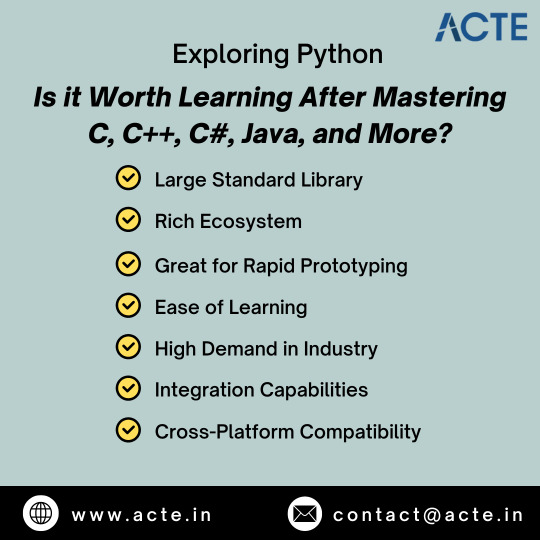
Straightforward Syntax:
The syntax of Python presents a refreshing change for developers, characterized by its legibility and user-friendly design. This attribute eases the learning process for both newcomers and experienced coders, emphasizing problem-solving over syntactic complexity.
Broad Application Scope:
Python's capability extends to a multitude of areas like web development, data science, artificial intelligence, computational science, and process automation, showcasing its adaptability and capacity to overcome cross-disciplinary challenges.
Expansive Library Support:
Armed with a comprehensive standard library, Python simplifies many routine programming tasks, from file handling and data parsing to database interactions. This robust library saves developers time and enhances workflow efficiency.
Thriving Ecosystem:
Boasting a prolific array of third-party frameworks and libraries, Python's ecosystem offers unparalleled support for a range of development projects. From web frameworks like Django to scientific libraries like NumPy and machine learning with TensorFlow, this ecosystem is an enabler for innovation and progress.
Community and Support:
Being part of the Python community ushers you into a world of supportive, collaborative, and knowledgeable individuals. This network is a treasure trove of resources, from tutorials to in-depth courses, bolstering your Python education.
Industry Demand:
The surge in Python's popularity has made it a top contender in the tech job market. As Python's utilization spreads across various applications globally, the demand for adept Python developers surges, promising a flourishing career landscape.
Effortless Integration:
Python distinguishes itself with its ability to mesh with other environments and platforms, making it a key player in modernizing tech stacks and facilitating complex software integrations.

Prototyping Proficiency:
Python shines in rapid prototyping, offering developers the leverage to quickly bring ideas to a proof of concept. The ease of iterating on these concepts in Python can greatly reduce development timelines.
Compatibility Across Different Platforms:
Python guarantees that your projects maintain compatibility with multiple operating systems such as Windows, macOS, and Linux. This cross-compatibility ensures that Python applications can effectively cater to a wider audience.
In essence, Python represents more than just a tool for writing code—it serves as an avenue to limitless creativity, forward-thinking initiatives, and career advancement. Regardless of where you stand on your programming journey, Python invites you into a world where your potential can fully unfold. By embracing Python, you unveil a prosperous future rich with diverse opportunities.
0 notes
Text
An Extensive Guide to Python Programming's Flexible Universe
In the coding world, Python distinguishes itself through its simplicity, flexibility, and clean syntax. Its widespread utilization across varied industries confirms its importance and efficiency. Python supports a wide array of applications, from web development and data analysis to automation and game development, making it indispensable for programmers and developers globally. This detailed guide explores Python's extensive features, highlighting its practical uses, essential tools, and relevance across different fields. For those aiming to boost their programming prowess, taking a Python course in Hyderabad provides a thorough foundation, offering deep insights and hands-on experience with this popular programming language.

Python in Web Development:
Python demonstrates significant strengths in web development through frameworks like Django and Flask. Django is renowned for its ability to facilitate rapid development and its clean, efficient design, ideal for complex website projects. Conversely, Flask is known for its simplicity and flexibility, suited for less complex web tasks.
Python's Impact on Data Science:
Python leads in data science with its vast array of libraries geared toward data manipulation, statistical analysis, and machine learning. Utilizing tools such as Pandas and NumPy allows data scientists to efficiently handle and analyze substantial data sets, extract deep insights, and conduct complicated statistical operations. The integration of Python with leading machine learning libraries like Scikit-learn and TensorFlow further bolsters its capacity to craft advanced predictive models, making it a pivotal element in data-centric initiatives.
Python for Automating Tasks:
Python excels in automating mundane activities throughout various domains, including data organization, web scraping, and system administration. Its straightforward syntax combined with a robust standard library enables developers to devise efficient scripts that simplify complex operations and reduce hands-on work.
Game Development Using Python:
Python extends its versatility to game development, supported by libraries such as Pygame, which provides necessary tools for developers to create engaging and interactive gaming experiences. Its approachable syntax and wide-ranging library options make it suitable for game developers at all expertise levels.
Scripting with Python:
The simplicity and adaptability of Python also shine in scripting, optimizing routine tasks, enhancing existing software functionalities, or crafting bespoke tools. Python's expressive programming and extensive library support fulfill diverse scripting needs effectively. To truly understand Python’s scripting prowess, enrolling in an online Python course can be very beneficial, blending expert guidance with practical projects.
Python for Desktop GUI Applications:
Python also extends beyond web and software development to creating desktop applications using libraries like Tkinter and PyQt. These enable developers to produce cross-platform desktop applications with graphical interfaces, providing user-friendly solutions for business, personal, or educational applications.
Python in the Internet of Things (IoT):
Python is apt for programming IoT devices and managing sensor data, thanks to its lightweight and adaptable nature. Its straightforward approach and substantial library support equip developers with the essential tools to efficiently develop and launch potent IoT solutions.
Web Scraping Using Python:
Python facilitates effective web scraping with libraries like BeautifulSoup and Scrapy, designed for easy extraction and manipulation of web data. These tools help in parsing HTML documents and collecting data for further processing or analysis
Scientific Computing with Python:
Python ventures into scientific computing with libraries such as SciPy and SymPy, providing sophisticated tools for numerical computation, optimization, and algebraic solutions. These capabilities are invaluable to scientists and researchers for conducting complex simulations, analyses, and addressing mathematical challenges.
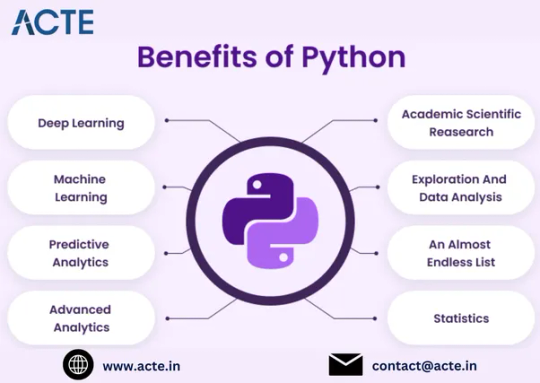
The Educational Significance of Python:
With its clear, legible syntax and well-documented nature, Python is an excellent entry point into programming. Its gentle learning curve and diverse applicational scope make it a top choice for newcomers to programming and computational sciences, enhancing their analytical and problem-solving abilities.
Backend Development with Python:
Python’s adaptability also shines in backend development, powering web servers and APIs across various sectors. Its easy-to-understand code, scalability, and extensive frameworks and libraries make it the preferred option for building sturdy, adaptable backend architectures capable of handling intricate data tasks and business logic.
Python in DevOps:
Python is indispensable in the DevOps arena, automating infrastructure tasks, system configurations, and software deployments. Its legible syntax and comprehensive standard library make it an ideal tool for scripting and creating applications that boost the efficiency and dependability of software development and operational procedures.
Conclusion:
Python’s multifunctional nature and wide scope make it a standout choice for developers and programmers across diverse sectors. Spanning web and software development, data analysis, automation, and more, Python offers a vast array of tools and libraries for creating detailed and innovative solutions. Engaging with Python programming unlocks endless possibilities, fostering creativity, innovation, and success in the constantly advancing realm of technology and development.
#python course#python#coding#programming#software development#web development#mobile app development#game development
0 notes
Text
Exploring Python: A Detailed Guide for New Programmers
Venturing into Python programming offers a thrilling and valuable experience in the tech sphere. For those new to coding, sifting through Python’s syntax, extensive libraries, and recommended practices might appear daunting. My comprehensive Python Course in Hyderabad equips you to produce outputs, deliver explanations, and guide on Python and a variety of other subjects, as it's grounded in the patterns and data I was trained on. Nevertheless, with the appropriate methodology and tools, achieving competencies in Python is well within reach. In this detailed guide, we will explore vital approaches and tips that can aid beginners in effectively learning Python and advancing toward skilled coder status.
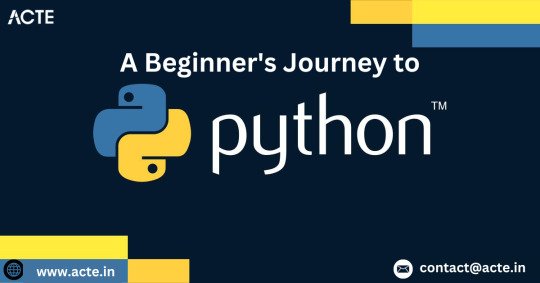
Grasping Core Principles:
Kicking off your Python education involves mastering key programming principles. Comprehending variables, data types, loops, conditional statements, and functions is foundational in Python coding. Establishing a thorough comprehension of these principles sets the stage for crafting more intricate software.
Consistent Coding Practice:
The age-old adage that practice leads to perfection holds true. Regular practice is critical for solidifying your grasp of concepts and polishing coding abilities. Platforms like LeetCode, HackerRank, and Codewars present numerous challenges and exercises tailored to novices, which are excellent for refining skills and deepening Python syntax and semantic knowledge.
Hands-On Projects:
Theoretical knowledge is a partial aspect of learning Python. Initiating hands-on projects and real-world applications allows beginners to embed Python principles effectively. Start with straightforward tasks like creating a simple calculator or to-do list app to apply the theoretical knowledge practically. With growing confidence, scaling project complexity will enhance your grasp and skillfulness in Python.
Educational Books and Materials:
The abundance of Python learning materials accessible is astounding. Titles such as “Automate the Boring Stuff with Python” by Al Sweigart, “Python Crash Course” by Eric Matthes, and “Learning Python” by Mark Lutz are crafted for beginners and offer clear explanations, actionable examples, and engaging exercises, steering new programmers on their Python path.
Digital Courses and Video Tutorials:
In the digital era, online courses and video tutorials are indispensable for learners. Platforms like ACTE Technologies provide Python online courses optimized for beginners, featuring structured courses, insightful videos, interactive quizzes, and projects that navigate learners through Python’s complexities. These digital resources allow flexible learning tailored to your schedule and availability from any internet-enabled location.
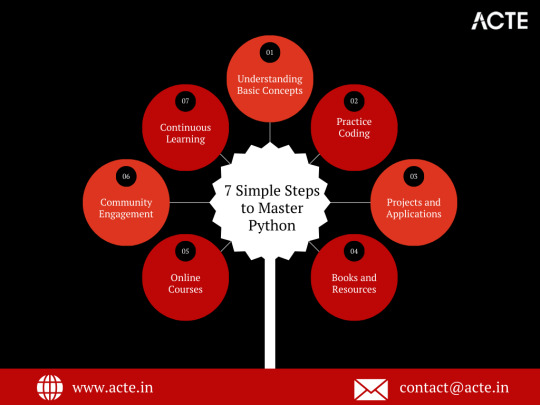
Joining the Community:
The Python community is notorious for its welcoming nature and readiness to support novices. Involvement with forums like Stack Overflow and Reddit’s r/learnpython, or local Python gatherings, opens doors for beginners to network with fellow enthusiasts, get advice, and exchange learnings. Entering into discussions, posting inquiries, and assisting peers enhances learning and aids in quicker assimilation of Python nuances.
Soliciting Constructive Criticism:
For novices, it is vital to seek out and apply feedback on their code. Sharing your work with fellow learners or mentors can pinpoint where enhancement is needed and elucidate best coding practices. Peer reviews in coding serve as an invaluable learning mechanism and assist novices in refining their coding strategies.
Ongoing Education:
The journey to Python mastery is continuous, with the language offering an ever-evolving palette of tools and concepts. Aspiring programmers must dedicate themselves to perpetually expanding their knowledge, discovering novel libraries, frameworks, and complex features. Staying abreast of industry shifts and new technologies places beginners at the cutting edge of Python development.
By adopting an attitude of persistent practice, learning, and discovery, new programmers can undertake a rewarding path to Python proficiency. With hard work, patience, and the right set of resources, Python’s programming domain is ripe for exploration. Hence, it’s time to delve in and start unraveling the engaging realm of Python!
1 note
·
View note